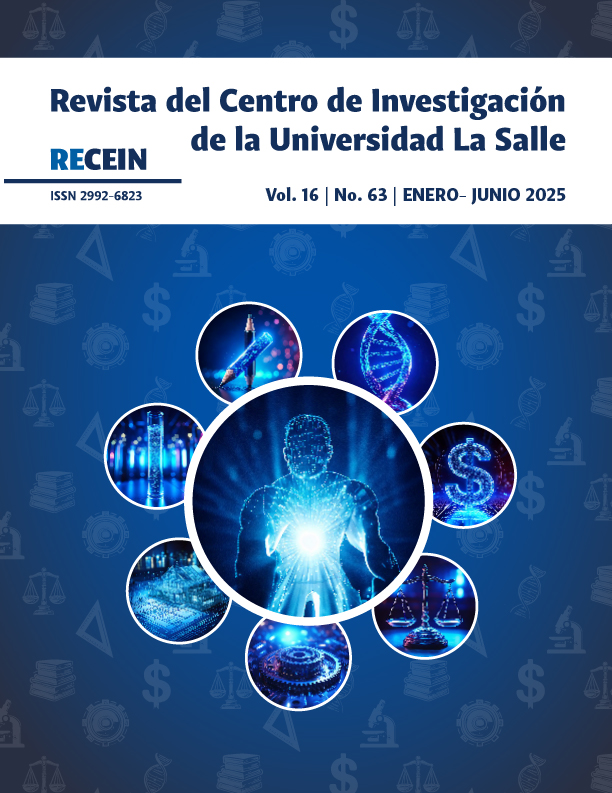Métodos de identificación del síndrome de text neck y factores relacionados: Revisión sistemática1512
Contenido principal del artículo
Resumen
Introducción: Síndrome de text neck se refiere al dolor de cuello causado por una lesión por estrés repetitivo o por uso excesivo, resultado de la flexión del cuello, durante un tiempo prolongado, mientras mira teléfonos móviles u otros dispositivos digitales; su diagnóstico no ha sido estandarizado como tal. Objetivo: obtener un panorama sobre los métodos que se han utilizado para diagnosticar síndrome de text neck y documentar los factores de riesgo relacionados a esta condición clínica. Metodología: Revisión sistemática sobre diagnóstico de: síndrome de text neck. Resultados: Trece estudios: diez utilizaron el índice de discapacidad cervical (NDI) considerando la presencia de síndrome de text neck cuando sumaban cinco o más puntos de 50 posibles, uno la escala NRS-11 y dos estudios incluyeron exploración física: evaluación postural y rangos de movilidad. Los factores de riesgo fueron sexo femenino, tres horas de uso de celular en postura cervical de 30° a 45° y otro trastorno musculo esqueléticos relacionado. Conclusión: Los métodos para diagnosticar síndrome de síndrome de text neck incluyen medidas no objetivas que priorizan la naturaleza subjetiva del dolor musculoesquelético: cuestionarios y exploración física. El uso de teléfono celular mayor a cinco horas es un factor de riesgo modificable.
Descargas
Detalles del artículo

Esta obra está bajo una licencia internacional Creative Commons Atribución-NoComercial-CompartirIgual 4.0.
Esta revista se encuentra bajo la licencia de Creative Commons, por tanto, los autores, al postular su artículo, lo adhieren a dicha licencia.El autor puede disponer de su artículo para su archivo en repositorios institucionales o en páginas web personales, con la referencia y agradecimientos a la fuente donde se ha publicado.
Citas
Ahmed, S., Akter, R., Pokhrel, N., & Samuel, A. J. (2019). Prevalence of text neck syndrome and SMS thumb among smartphone users in college-going students: a cross-sectional survey study. Journal of Public Health 2019 29:2, 29(2), 411–416. https://doi.org/10.1007/S10389-019-01139-4
Alshahrani, A., Samy Abdrabo, M., Aly, S. M., Alshahrani, M. S., Alqhtani, R. S., Asiri, F., & Ahmad, I. (2021). Effect of Smartphone Usage on Neck Muscle Endurance, Hand Grip and Pinch Strength among Healthy College Students: A Cross-Sectional Study. International Journal of Environmental Research and Public Health, 18(12). https://doi.org/10.3390/IJERPH18126290
Alsiwed, K. T., Alsarwani, R. M., Alshaikh, S. A., Howaidi, R. A., Aljahdali, A. J., Bassi, M. M., … Bassi, M. M. (2021a). The prevalence of text neck syndrome and its association with smartphone use among medical students in Jeddah, Saudi Arabia. Journal of Musculoskeletal Surgery and Research, 5(4), 266–272. https://doi.org/10.25259/JMSR_99_2021
Alsiwed, K. T., Alsarwani, R. M., Alshaikh, S. A., Howaidi, R. A., Aljahdali, A. J., Bassi, M. M., … Bassi, M. M. (2021b). The prevalence of text neck syndrome and its association with smartphone use among medical students in Jeddah, Saudi Arabia. Journal of Musculoskeletal Surgery and Research, 5(4), 266–272. https://doi.org/10.25259/JMSR_99_2021
AlZarea, B. K., & Patil, S. R. (2015). Mobile Phone Head and Neck Pain Syndrome : Proposal of a New Entity. Recuperado de https://api.semanticscholar.org/CorpusID:13584277
Andrade Ortega, J. A. (2012). Validación de una versión española del “neck disability index” y uso de la misma para investigar la eficacia de la diatermia por microondas en el dolor cervical crónico inespecífico. Universidad de Jaén.
Andrade Ortega, J. A., Martínez, A. D. D., & Ruiz, R. A. (2008). Validación de una versión Española del Índice de Discapacidad Cervical. Medicina Clinica, 130(3), 85–89. https://doi.org/10.1157/13115352
Angilecchia, D., Mezzetti, M., Chiarotto, A., Daugenti, A., Giovannico, G., & Bonetti, F. (2018). Development, validity and reliability of the Italian version of the Copenhagen neck functional disability scale. BMC Musculoskeletal Disorders, 19(1), 1–9. https://doi.org/10.1186/S12891-018-2332-Z
Bier, J. D., Scholten-Peeters, W. G. M., Staal, J. B., Pool, J., van Tulder, M. W., Beekman, E., … Verhagen, A. P. (2018). Clinical Practice Guideline for Physical Therapy Assessment and Treatment in Patients With Nonspecific Neck Pain. Physical therapy, 98(3), 162–171. https://doi.org/10.1093/PTJ/PZX118
Can, S., & Karaca, A. (2019). Determination of musculoskeletal system pain, physical activity intensity, and prolonged sitting of university students using smartphone. Biomedical Human Kinetics, 11(1), 28–35. https://doi.org/10.2478/bhk-2019-0004
Centeno-Leguía, D., & Cubas, W. S. (2019). Síndrome de text-neck: una nueva pandemia en la era smartphone. Revista Medica Herediana, 30(3), 207–208.
Chaudary, A. A., Aslam, F., ali, A., Asghar, A. R., Bashir, H., Awais, A., … M, M. (2019). Frequency of Text Neck Syndrome in Medical Students due to Excessive Usage of Electronic Devices. Journal of Pakistan Orthopaedic Association, 31(02), 79–82. Recuperado de https://jpoa.org.pk/index.php/upload/article/view/325
Childress, M. A., & Stuek, S. J. (2020). Neck Pain: Initial Evaluation and Management. American Family Physician, 102(3), 150–156. Recuperado de https://www.aafp.org/pubs/afp/issues/2020/0801/p150.html
Chu, E. C. P. (2022). Preventing the progression of text neck in a young man: A case report. Radiology Case Reports, 17(3), 978. https://doi.org/10.1016/J.RADCR.2021.12.053
Cohen, S., & Hooten, W. (2017). Advances in the diagnosis and management of neck pain. BMJ (Clinical research ed.), 358(12), j3221. https://doi.org/10.1136/BMJ.J3221
Correia, I., Ferreira, A., Fernandez, J., Reis, F., Nogueira, L., & Meziat Filho, N. (2020). Association Between Text Neck and Neck Pain in Adults. Spine, Publish Ah. https://doi.org/10.1097/BRS.0000000000003854
Damasceno, G. M., Ferreira, A. S., Nogueira, L. A. C., Reis, F. J. J., Andrade, I. C. S., & Meziat-Filho, N. (2018). Text neck and neck pain in 18-21-year-old young adults. European Spine Journal : Official Publication of the European Spine Society, the European Spinal Deformity Society, and the European Section of the Cervical Spine Research Society, 27(6), 1249–1254. https://doi.org/10.1007/S00586-017-5444-5
David, D., Giannini, C., Chiarelli, F., & Mohn, A. (2021a). Text Neck Syndrome in Children and Adolescents. International Journal of Environmental Research and Public Health, 18(4), 1–14. https://doi.org/10.3390/IJERPH18041565
David, D., Giannini, C., Chiarelli, F., & Mohn, A. (2021b). Text Neck Syndrome in Children and Adolescents. International Journal of Environmental Research and Public Health, 18(4), 1–14. https://doi.org/10.3390/IJERPH18041565
Dominguez Gasca, L. G., Maldonado, A., & Dominguez, L. G. (2018). Síndrome miofascial cervical por comunicación escrita en teléfono celular. 16.
Ezoe, S., Toda, M., Yoshimura, K., Naritomi, A., Den, R., & Morimoto, K. (2009). Relationships of personality and lifestyle with mobile phone dependence among female nursing students. Social Behavior and Personality, 37, 231–238. Recuperado de https://api.semanticscholar.org/CorpusID:144438329
Hansraj, K. K. (2014). Assessment of stresses in the cervical spine caused by posture and position of the head. Surgical technology international, 25(1), 277—279. Recuperado de http://europepmc.org/abstract/MED/25393825
How to soothe a sore neck. The essentials are icing and heat, gentle therapeutic exercise, and good posture. (2014). Harvard men’s health watch, 18 11, 5. Recuperado de https://api.semanticscholar.org/CorpusID:28811331
Hoy, D., Brooks, P., Woolf, A., Blyth, F., March, L., Bain, C., … Buchbinder, R. (2012). Assessing risk of bias in prevalence studies: modification of an existing tool and evidence of interrater agreement. Journal of Clinical Epidemiology, 65(9), 934–939. https://doi.org/10.1016/J.JCLINEPI.2011.11.014
Jorritsma, W., Vries, G. E. de, Dijkstra, P. U., Geertzen, J. H. B., & Reneman, M. F. (2012). Neck Pain and Disability Scale and Neck Disability Index: validity of Dutch language versions. European Spine Journal, 21(1), 93. https://doi.org/10.1007/S00586-011-1920-5
Jyothsna, G. (2019). Text Neck Syndrome in Adolescents: How to Stem the Tide? IntJPediatrNurs, 5(1), 35–41. Recuperado de http//dx.doi.org/10.21088/potj.094..119.%0D
Kadhim Rashid, M., Ahmed Ali Jadoo, S., Hassan Al-Hussainy, A., & Ibrahim Latif, I. (2022). Prevalence of text neck syndrome among Iraqi medical students: a cross-sectional study. Journal of Ideas in Health, 5(Special1), 693–699. https://doi.org/10.47108/JIDHEALTH.VOL5.ISSSPECIAL1.229
Kamaraj, N., Rajasekar, V. D., & Rangasamy, S. (2022). A study on prevalence of text neck syndrome among under-graduate students of a medical college in Puducherry. International Journal Of Community Medicine And Public Health, 9(7), 2919–2922. https://doi.org/10.18203/2394-6040.ijcmph20221759
Kaur, A., & Makker, S. (2021). A Study to Assess the Prevalence of Text Neck Syndrome and Quality of Sleep among Smartphone Users in Selected Colleges of District Ludhiana, Punjab. International Journal of Health Sciences and Research, 11(9), 49–54. https://doi.org/10.52403/IJHSR.20210907
Kazemi, S. S., Javanmardi, E., & Ghazanfari, E. (2017). International Journal of Musculoskeletal Pain prevention Relationship between General Health and Musculoskeletal Disorders among Tarbiat Modares University Students. International Journal of Musculoskeletal Pain prevention, 2(3), 287–291. Recuperado de http://ijmpp.modares.ac.ir/article-32-8145-en.html
Kumari, S., Kumar, R., & Sharma, D. (2021). Text Neck Syndrome: The Pain of Modern Era. Journal of Health Sciences & Research, 11, 161–165. https://doi.org/10.52403/ijhsr.20211121
Manterola, C., Asenjo-Lobos, C., & Otzen, T. (2014). Jerarquización de la evidencia: Niveles de evidencia y grados de recomendación de uso actual. Revista chilena de infectología, 31(6), 705–718. https://doi.org/10.4067/S0716-10182014000600011
Miaraj, A., & Bhat, I. (2022). Prevalence of Text Neck Syndrome and Its Association with Mobile Phone Usage Among University Academic Staff. Int J Phys Med Rehabil, 9(5), 1000p010.
Misailidou, V., Malliou, P., Beneka, A., Karagiannidis, A., & Godolias, G. (2010a). Assessment of patients with neck pain: a review of definitions, selection criteria, and measurement tools. Journal of Chiropractic Medicine, 9(2), 49. https://doi.org/10.1016/J.JCM.2010.03.002
Misailidou, V., Malliou, P., Beneka, A., Karagiannidis, A., & Godolias, G. (2010b). Assessment of patients with neck pain: a review of definitions, selection criteria, and measurement tools. Journal of Chiropractic Medicine, 9(2), 49. https://doi.org/10.1016/J.JCM.2010.03.002
Moher, D., Shamseer, L., Clarke, M., Ghersi, D., Liberati, A., Petticrew, M., … Stewart, L. A. (2016). Ítems de referencia para publicar Protocolos de Revisiones Sistemáticas y Metaanálisis: declaración PRISMA-P 2015 . Revista Española de Nutrición Humana y Dietética , Vol. 20, pp. 148–160. scieloes .
Naghdi, S., Ansari, N. N., ShamsSalehi, S., Feise, R. J., & Entezary, E. (2016). Validation of the functional rating index for the assessment of athletes with neck pain. World Journal of Orthopedics, 7(8), 507. https://doi.org/10.5312/WJO.V7.I8.507
Nawaz, U., Jamshaid, A., Rafi, M. A., & Hussain, H. (2020). Frequency of Text Neck Pain in Islamabad. Pakistan Journal of Public Health, 10(4), 252–255. https://doi.org/10.32413/PJPH.V10I4.281
Neupane, S., Ifthikar-Ali, U., & Mathew, A. (2017). Text Neck Syndrome - Systematic Review. IJIR, 3(7), 141–148.
Popescu, A., & Lee, H. (2020). Neck Pain and Lower Back Pain. The Medical clinics of North America, 104(2), 279–292. https://doi.org/10.1016/J.MCNA.2019.11.003
Prushansky, T., & Dvir, Z. (2008). La prueba de la movilidad cervical: metodología e implicaciones clínicas. Osteopatía Científica, 3(3), 108–114. https://doi.org/10.1016/S1886-9297(08)75759-X
Roney, L. N., Beauvais, A. M., & Bartos, S. (2020, septiembre 1). Igniting Change: Supporting the Well-Being of Academicians Who Practice and Teach Critical Care. Critical Care Nursing Clinics of North America, Vol. 32, pp. 407–419. https://doi.org/10.1016/j.cnc.2020.05.008
Salgado, S., & Kaplitt, M. G. (2015). The Nucleus Accumbens: A Comprehensive Review. Stereotactic and functional neurosurgery, 93(2), 75—93. https://doi.org/10.1159/000368279
Samani, P. P., Athavale, N. A., Shyam, A., & Sancheti, P. K. (2018). Awareness of text neck syndrome in young-adult population. International Journal Of Community Medicine And Public Health, 5(8), 3335–3339. Recuperado de https://www.ijcmph.com/index.php/ijcmph/article/view/2743
Santamaría Olmo, R. (2017). Programa de Habilidades en Lectura Crítica Español (CASPe). Nefrología, 9(1), 100–101. Recuperado de https://www.revistanefrologia.com/es-programa-habilidades-lectura-critica-espanol-articulo-X1888970017612483
Sathya, P., & Tamboli, S. (2020). Prevalence of Text Neck Syndrome In Young-Adult population. International Journal Medical and Exercise Science, 06, 749–759. https://doi.org/10.36678/ijmaes.2020.v06i02.004
Shah, P. P., & Sheth, M. S. (2018). Correlation of smartphone use addiction with text neck syndrome and SMS thumb in physiotherapy students. International Journal Of Community Medicine And Public Health, 5(6), 2512. https://doi.org/10.18203/2394-6040.ijcmph20182187
Sitthipornvorakul, E., Janwantanakul, P., Purepong, N., Pensri, P., & van der Beek, A. J. (2011). The association between physical activity and neck and low back pain: a systematic review. European Spine Journal, 20(5), 677–689. https://doi.org/10.1007/s00586-010-1630-4
Song, X., Fu, W., Liu, X., Luo, Z., Wang, R., Zhou, N., … Lv, C. (2020). Mental health status of medical staff in emergency departments during the Coronavirus disease 2019 epidemic in China. Brain, Behavior, and Immunity, 88, 60–65. https://doi.org/10.1016/j.bbi.2020.06.002
Torraco, R. J. (2016, diciembre 1). Writing Integrative Literature Reviews: Using the Past and Present to Explore the Future. Human Resource Development Review, Vol. 15, pp. 404–428. https://doi.org/10.1177/1534484316671606
Zheng, F., Gao, P., He, M., Li, M., Wang, C., Zeng, Q., … Zhang, L. (2014). Association between mobile phone use and inattention in 7102 Chinese adolescents: a population-based cross-sectional study. BMC Public Health, 14(1), 1022. https://doi.org/10.1186/1471-2458-14-1022
 English
English


